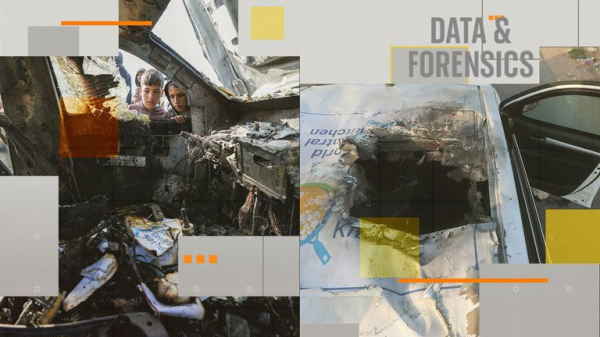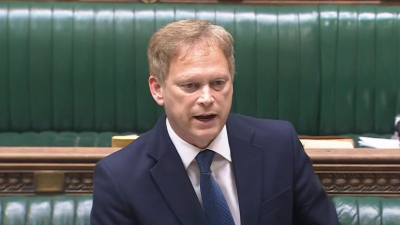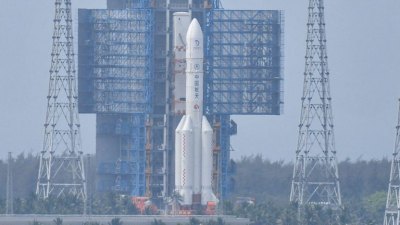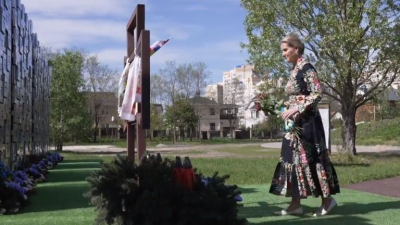Amidst the rubble and chaos of Gaza, an Israeli airstrike has left a trail of devastation, claiming the lives of seven aid workers, including three Britons, in what has been described as an "unforgivable" tragedy. The strike obliterated the operations team of a prominent aid organization, dedicated to feeding half a million people in Gaza, leaving behind a haunting void in humanitarian efforts. According to a spokesperson from the World Food Programme, the incident has sent shockwaves through the humanitarian community.
Israel's Prime Minister, Benjamin Netanyahu, has publicly acknowledged the responsibility of Israeli forces in carrying out the strike, expressing remorse and pledging efforts to prevent such tragedies from recurring. The aid workers, affiliated with the charity World Central Kitchen (WCK), were traversing a "deconflicted zone" in three vehicles, their movements meticulously coordinated with the Israeli army, as attested by the charity.
The ill-fated convoy had departed from its warehouse in Deir al Balah, central Gaza, laden with over 100 tonnes of essential food aid, recently delivered to its pier near Gaza City. However, tragedy struck along the al Rashid coastal road, where three mangled vehicles bore witness to the catastrophic event, scattered across a span of 2.4 kilometers.
Initial reports suggest that the strike occurred between 10:30 pm and 11:00 pm local time on Monday, with social media buzzing with distressing updates as early as 10:52 pm. Two of the vehicles were armored, underscoring the perilous conditions aid workers often face in conflict zones.
Among the wreckage lies a burned-out car, bearing poignant remnants of the humanitarian mission, including paper materials emblazoned with WCK's branding—a stark reminder of the lives lost in the line of duty. Although some branded material might have been placed post-strike, the grim reality of the incident remains undeniable.
Further scrutiny reveals a second vehicle, its roof adorned with the unmistakable logo of WCK, positioned approximately 810 meters southwest along the road. The punctured roof and visibly damaged interior bear witness to the force of the strike, yet the integrity of its windows remains intact—a silent testament to the chaos and uncertainty that unfolded that fateful night.
As the world grapples with the aftermath of this tragic event, questions linger about the circumstances leading to the airstrike and the measures needed to prevent such loss of life in the future. In the heart of Gaza, amidst the rubble and despair, the memory of the fallen aid workers serves as a poignant reminder of the relentless pursuit of humanity's noblest ideals, even in the face of adversity and tragedy.
Analyzing the visuals depicting the second vehicle with the punctured roof, a spokesperson for Janes, a defense intelligence firm, provided insights to Sky News, suggesting that the entry point indicates the use of a "relatively small precision-guided munition." Despite the absence of identifiable fragments in the images, the spokesperson remarked on the limited damage, noting intact windows and minimal buckling beyond the immediate roof panel. This observation led to the inference that the munition likely had a small yield, a low-collateral warhead, or an inert payload relying on kinetic energy for its effect.
Examining a third car, which exhibited similar damage to the first vehicle, geolocated footage unveiled a white burned-out vehicle positioned approximately 1.6 kilometers southwest along the same road. Within this car, a high-visibility vest bearing WCK branding was discernible in the back seat, hinting at its affiliation with the aid organization. Given the heightened damage to its body compared to the other vehicles, it is presumed to be the unarmored vehicle described by WCK. However, from the available visual evidence, it remains uncertain which vehicle the victims were in.
Subsequent footage depicted the transportation of the victims' bodies to the al Aqsa Hospital in the northeast of Deir Al Balah, marking a somber conclusion to the tragic event.
Matthew Hollingworth, the World Food Programme (WFP) country director for Palestine, shed light on the circumstances surrounding the incident, revealing that the team was "on the way back to their base" in Rafah at the time of the strike. Expressing solidarity between WFP and WCK, Hollingworth emphasized the devastating impact on the operations team of the latter, emphasizing the critical role these individuals played in humanitarian efforts. Despite the profound loss, Hollingworth underscored the imperative of persevering in delivering aid, emphasizing, "none of us can afford to stop" amidst the ongoing crisis in Gaza.
In the heart of Gaza, where the struggle for survival intertwines with humanitarian efforts, the organization was a beacon of hope, providing sustenance to half a million people through vital centers like the field kitchen nestled in the east of Deir al Balah. However, this beacon was dimmed by an unfathomable tragedy.
The devastating airstrike, denounced as "unforgivable" by Erin Gore, the chief executive of WCK, reverberated as an assault not just on their organization but on the very essence of humanitarianism. Gore lamented that in the direst of circumstances, where food becomes a weapon of war, the strike served as a grim reminder of the challenges faced by those striving to alleviate suffering in conflict zones.
The repercussions of the strike were profound as operations ground to a halt in the aftermath of the loss of their dedicated workers. Among the fallen were individuals from diverse backgrounds, including three British nationals, an Australian, a Polish national, an American-Canadian dual citizen, and a Palestinian, as documented by hospital records.
The international community, including the US, Britain, Poland, and Australia, echoed calls for accountability, urging Israel to provide an explanation or conduct a thorough investigation into the deaths of the aid workers. In response to the tragedy, Anera, a longstanding aid group based in Washington, took the unprecedented step of suspending its operations in Gaza, where it had been instrumental in providing approximately 150,000 meals daily.
In the wake of mounting pressure, Rear Admiral Daniel Hagari, an Israeli military spokesman, assured that authorities were meticulously scrutinizing the incident at the highest levels. He pledged to initiate an independent investigation, recognizing the gravity of the situation and the need for transparency.
As the world grapples with the aftermath of this senseless loss, additional reporting by Ben van der Merwe, forensics journalist, Adam Parker, OSINT editor, and Natasha Muktarsingh, assistant editor, Data and Forensics, sheds light on the complexities surrounding the incident. The Data and Forensics team at Sky News, comprising a multi-skilled unit dedicated to transparent journalism, employs a combination of traditional reporting and advanced analysis techniques to unravel the truth. Through their meticulous efforts, they strive to not only illuminate the world's complexities but also exemplify the rigorous standards upheld in journalistic endeavors.
In conclusion, the tragic airstrike in Gaza, claiming the lives of dedicated aid workers, has sent shockwaves through the humanitarian community and elicited calls for accountability from around the globe. As organizations like WCK and Anera grapple with the loss of their personnel and the suspension of vital operations, the international community demands answers and assurances of justice.
Amidst the sorrow and outrage, Rear Admiral Daniel Hagari's commitment to a thorough investigation offers a glimmer of hope for transparency and accountability. However, the road ahead remains fraught with challenges, as the complexities of conflict and the imperative of humanitarian assistance intersect in the volatile landscape of Gaza.
As we mourn the lives lost and honor the tireless efforts of those committed to alleviating suffering, the resolve to continue delivering aid remains unwavering. In the face of adversity, the resilience of the human spirit shines through, bolstered by the unwavering determination to build a better, more compassionate world. Through collective action and unwavering solidarity, we strive to honor the memory of the fallen and uphold the principles of humanity in the pursuit of peace and justice for all.







